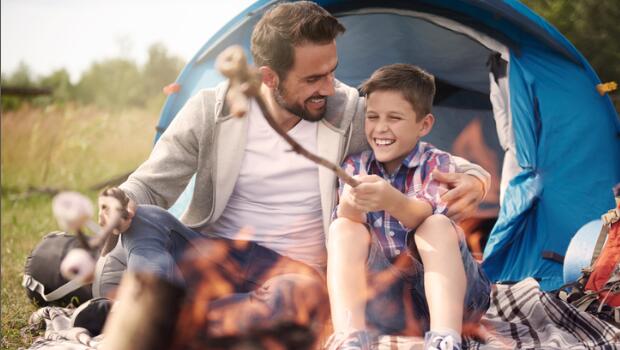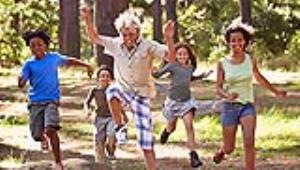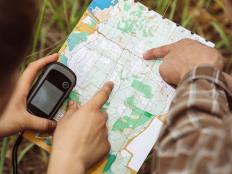
As the campfire begins to die down, your child yawns one last time, rubs his eyes, and tells you how much fun he had today. Then he heads off to his tent to spend a cozy night in his sleeping bag, dreaming of what adventures the next day will bring.
At least that's the fantasy for nature-loving parents who would like nothing more than to pass on their appreciation of the outdoors to their kids.
Such an idyllic scenario might not always match the idyllic scenery of your campground, but rest assured, camping with kids doesn't have to be a challenge. Here are some tips to make any camping trip memorable for your young ones, and leave them counting the days till the next outing.
Before You Go
It's impossible to overstate the importance of proper planning. You want your outdoor adventure to fit your child's experience, maturity and skill level, and a little bit of research and preparation will go a long way toward maximizing their enjoyment.
Involve your kids in the planning process. Get their input when selecting a campground, choosing activities, even planning meals. They'll be more invested in the adventure and more engaged when you get to the campground.
Select a campground that fits your desires and skills. First-timers may want amenities such as tents or cabins, bathrooms, showers and access to town for restaurants. Older, experienced campers may prefer pitching their own tent in the solitude of a more remote, wilderness campground. Many large parks such as Yosemite offer a variety of campground options.
Do a dry run. Spend a night camping in the backyard, the perfect spot for a shakedown cruise. Your child will get a first taste of camping, but with the security of being at home. You'll be able to test out your gear, and you'll learn about your child's comfort level outdoors. Better to know now that there's a favorite pillow or stuffed animal he can't sleep without than finding out when you're miles from home.
Let them pack. Draw up a list of what they'll need, but allow them to pull everything together. You'll want to check to make sure nothing is missing before you leave, of course, but kids will benefit from the responsibility that comes with being in charge of their own gear.
Reinforce the outdoor experience. Spend time with relatives and friends--yours and your child's--who also like to hike and camp. Knowing that a favorite aunt likes to get out on the trail or a cousin is envious of your upcoming trip reinforces to your child that getting outdoors is not just a way for his crazy parents to torment him by pulling him away from the creature comforts of home..
At the Campground
Involve your kids upon arrival at camp. Let them help pick the tent site, pitch the tent, set up the cooking area. Draw up a duty roster so everyone knows he's responsible for certain chores, such as helping with cooking, washing dishes or keeping the campsite clean.
Establish camp rules. Walk the boundaries of your campsite with your kids so they know where they're allowed to go and where is off-limits. Use the buddy system to make sure they never wander off alone, and make sure they know they always have to tell an adult if they're going somewhere out of eyesight.
Engage in activities. Once everything is set up, it's time to start the activities you've mapped out. Hiking, fishing, bike riding if your campground allows, even just exploring the surroundings, are all great ways for kids to get out and enjoy nature. Consider a "scavenger hunt" with a simple pencil and notebook; have them try to identify 10 plants and 10 animals in the wild. Or if your child likes to take photos, have them record their finds with a camera. Many national parks offer "Junior Ranger" programs that give kids the chance to take part in educational programs and activities.
Plan for campsite activities. Don't forget to plan some campground activities when camping with kids. You might be totally content to spend long afternoons in a camp chair with a good book, but your kids will probably need more stimulation. Tuck away a Frisbee, a deck of cards and a board game or two for the downtime.
Have a Plan B. Speaking of which, inclement weather could leave you with more downtime than you anticipated. It's always good to have a Plan B in place in the event rain or thunderstorms disrupt your planned activities.
Establish ground rules regarding electronic devices. The easiest solution is to leave the gadgets at home. After all, you're there to enjoy the outdoors. If that's too draconian, perhaps you can restrict access to one hour a day before dinner, or better yet after KP (kitchen patrol) is done. And consider using those devices for educational endeavors; rather than dealing with angry birds, download an app that identifies constellations, or plants native to your location.
Finally, be flexible when camping with kids. Odds are your outing probably isn't going to go exactly how you planned it. Maybe someone in your group just isn't good at getting going in the morning, or an afternoon rainstorm disrupts your plans. Roll with it. Nature is often unpredictable. The point is not to stress out about putting a checkmark next to every single thing on your wish list, but to enjoy being outdoors with your kids. If you're not enjoying the experience, it will be hard for them to.
 Book your next camping trip
Book your next camping trip









Discuss This Article